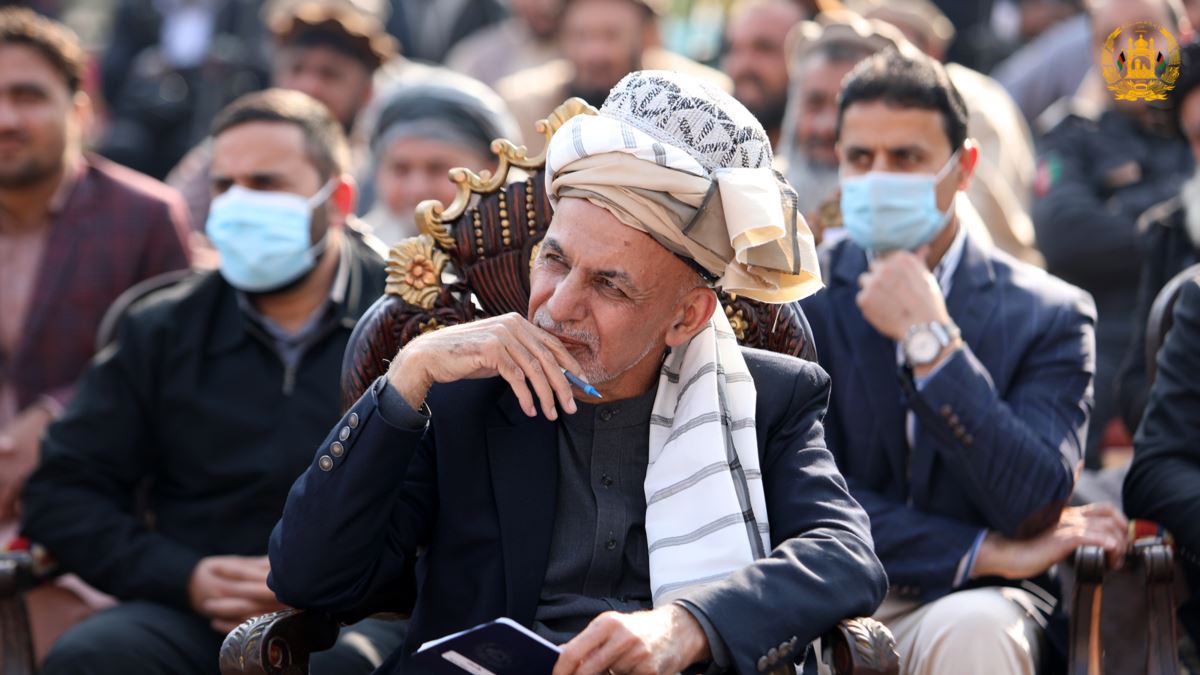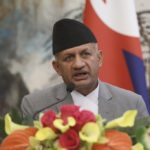Peace talks between Afghan government representatives and the Taliban have been painstakingly slow, bogged down for months by disagreements over minor issues.
The warring sides have agreed on the rules and procedures for the negotiations. But they have yet to settle on an agenda for the talks. Negotiations over the substantial issues — including a permanent cease-fire and a power-sharing formula — are far off.
Progress has been hampered by deep mistrust and animosity. A huge gulf remains on key issues between the sides, which have conflicting priorities in the negotiations.
Those divisions have been exacerbated by soaring violence. Both sides have intensified military operations, particularly the Taliban, which sees violence as its main source of leverage against the government.
Amid the bloody impasse, there have been growing calls for President Ashraf Ghani to step down and a neutral interim government that includes the Taliban to take over.
That transitional authority could pave the way for a political settlement, proponents say, including the future distribution of power and changes to the constitution.
The idea has been floated privately by U.S. officials and has been supported by the Taliban, Pakistan — the militant group’s main foreign sponsor — and some Afghan opposition figures. But the proposal is deeply controversial and has been strongly rejected by Ghani and his allies.
Supporters of the idea say it would stop the escalating violence and allow the warring Afghan factions to reach a settlement, given the Taliban’s refusal to recognize Ghani’s administration.
But critics describe it as premature and a risky ploy that could trigger chaos and state collapse. Opponents say the idea is being pushed by opposition figures who want to gain a stake in power.
A political settlement is a key part of the U.S.-Taliban agreement signed in February 2020 that is aimed at ending the war.
That deal calls for the withdrawal of all foreign forces in Afghanistan by May in return for counterterrorism guarantees from the Taliban, which is to negotiate a permanent cease-fire and a power-sharing arrangement with the internationally recognized government in Kabul.
It is unclear if President-elect Joe Biden, who takes office on January 20, will stick to the deal. The Afghan government and the Taliban have effectively put peace talks on hold in recent weeks as they wait for signals from the new U.S. administration.
‘Undeniable Topic’
Calls for an interim government have grown since Afghan and Taliban negotiators reconvened for talks in the Gulf state of Qatar on January 5, following a 20-day hiatus.
The talks have turned toward setting an agenda for the talks — what and in which order issues should be negotiated by the sides.
But the discussions have stalled.
The government is prioritizing a permanent cease-fire. The Taliban wants to discuss power-sharing, insisting it will only agree to a cease-fire when progress is made on the form of a future power-sharing government.
“An interim government is an undeniable topic of discussion, because we want a cease-fire and the Taliban aren’t ready to agree to one with the current government,” said Hafiz Mansur, a member of the government negotiating team, on January 3.
Amin Ahmadi, another government negotiator, said in an interview on January 7 that the international community backed an interim government, adding that “we cannot say no to the world’s demand.”
Meanwhile, Atta Mohammad Noor, a powerful regional leader, said on January 7 that “we should not oppose” the idea of an interim government “but further develop it for the sake of national unity.”
Those calls came as U.S. envoy for Afghanistan Zalmay Khalilzad visited Kabul last week where he held talks with senior Afghan officials and key power brokers to gauge their support for an interim government, Afghan media reported. Ghani did not meet with the U.S. diplomat.
Gul Rahman Qazi, a close aide to former President Hamid Karzai, with whom Khalilzad held talks, said “three options” were discussed.
“The first one is to include the Taliban in the present government, the second option is to merge this government with the Taliban, but both of these options aren’t acceptable for the international community. The third option was to establish an interim and inclusive government.”
Ross Wilson, the most senior U.S. diplomat in Kabul, denied that Washington had “advocated” for the creation of an interim government.
“We have not advocated, and the United States is not advocating, an interim government,” Wilson said in a tweet on January 13. “The outcomes of Afghanistan Peace Negotiations are up to Afghans & we believe those outcomes should reflect the wishes & aspirations of the Afghan people.”
‘Peace Of The Graveyard’
Ghani ruled out an interim government with the Taliban last week, saying he would complete his five-year term as president.
Ghani won a 2019 presidential election that was marred by record-low turnout and widespread irregularities.
Khalilzad had first proposed the idea of an interim government before the election but it was rejected by Ghani, the incumbent.
“My basic goal is to be able to hand power, through the will of the people, to my elected successor,” Ghani told CNN on January 8. “We’re not a type of society that the Taliban-type approach of the past can be imposed on us. That was the peace of the graveyard.”
Second Vice President Sarwar Danish recently warned that an interim government would “mean rupture and the collapse and dissolution of the constitution.”
Critics have accused Ghani and his allies of stalling the peace process to retain power.
Critics say the president has surrounded himself with staunch anti-Taliban figures, including First Vice President Amrullah Saleh, a former intelligence chief.
Ghani this month also reappointed as his adviser Mohammad Mohaqiq, a former anti-Taliban commander. Last year, the president dismissed Mohaqiq, a senior figure in the mainly Shi’ite Hazara ethnic community.
Critics have also accused Ghani of stalling the peace process in the hope that the Biden administration would reverse the withdrawal of U.S. forces or even renegotiate the terms of the U.S.-Taliban peace deal. Observers consider both scenarios unlikely.
That agreement excluded Ghani’s government and is seen as skewed in favor of the militants.
‘Collapse Of The State’
Torek Farhadi, an analyst and former Afghan government adviser, says Ghani has become a “polarizing” figure who has postponed “peace possibilities” in Afghanistan.
The Taliban has called Ghani an American “puppet” and ruled out joining the current political system.
“Because of the emergency situation we are in, Afghanistan can’t afford for President Ghani to complete his term while dozens of Afghans are killed every day,” says Farhadi. “It is not sustainable and over time it risks the collapse of the state after the exit of the foreign forces.”
The solution, Farhadi says, is a transitional authority that oversees an end to hostilities and gives the warring Afghan factions the space to agree to a political settlement.
“To end this war, and because no side is winning it, I don’t expect the Afghan government to join a Taliban government nor the Taliban to join the Afghan government,” he says. “There is a need for a transitional governance structure including both.”
‘Further Fragmentation’
But critics also say the idea of an interim government is premature, given that the Taliban has yet to show the willingness to make the significant compromises needed to reach a political settlement.
The Taliban has entered peace talks from a position of relative strength. Controlling or contesting roughly half of the country, the extremist group has the military advantage to drive a hard bargain at the negotiations, observers say.
Under the U.S.-Taliban deal, the militant group extracted substantial concessions from Washington, including a timetable for the complete withdrawal of all foreign forces, its core demand.
Afghan officials fear that the Taliban could simply wait out the United States and forcibly attempt to take control of the country after a complete pullout. The U.S. military has reduced U.S. troops to around 2,500 — the lowest since the war began in 2001.
The United States also made controversial pledges on behalf of the Afghan government, including the release of 5,000 Taliban inmates. In return, the militants made only small concessions.
Critics say the agreement gave the Taliban international legitimacy and recognition, while undermining the Western-backed government in Kabul.
Emboldened by what it sees as its “victory” in the war, the Taliban has intensified attacks on government forces and killed dozens of civic and political figures in recent months, seeking to further undermine the Kabul government.
Davood Moradian, the director of the Afghan Institute for Strategic Studies, a Kabul-based think tank, says an interim government should only be explored as a way forward if and when it is part of a mutual tradeoff or an overall peace deal.
“Amid the Taliban’s political advancement and military consolidation and expansion, talk of an interim government will only result in the further fragmentation of the government, which would not advance the peace process,” he says.
Memories are still fresh of the anarchy and violence following the decision of former President Mohammad Najibullah, Afghanistan’s last communist leader, to resign.
Najibullah’s announcement in 1992 was intended to pave the way for an interim government that would include the mujahedin, the U.S.-backed Islamist rebels that had fought against Soviet and Afghan communist forces.
Instead, state institutions broke down and a devastating civil war erupted that eventually paved the way for the rise of the Taliban. When the Taliban seized control of Kabul in 1996, it brutally tortured and executed Najibullah, who had been living in a United Nations compound.
“Dr. Najibullah made the mistake of his life by announcing that he was going to resign,” Ghani said during a June event in Washington. “Please don’t ask us to replay a film that we know well.”













